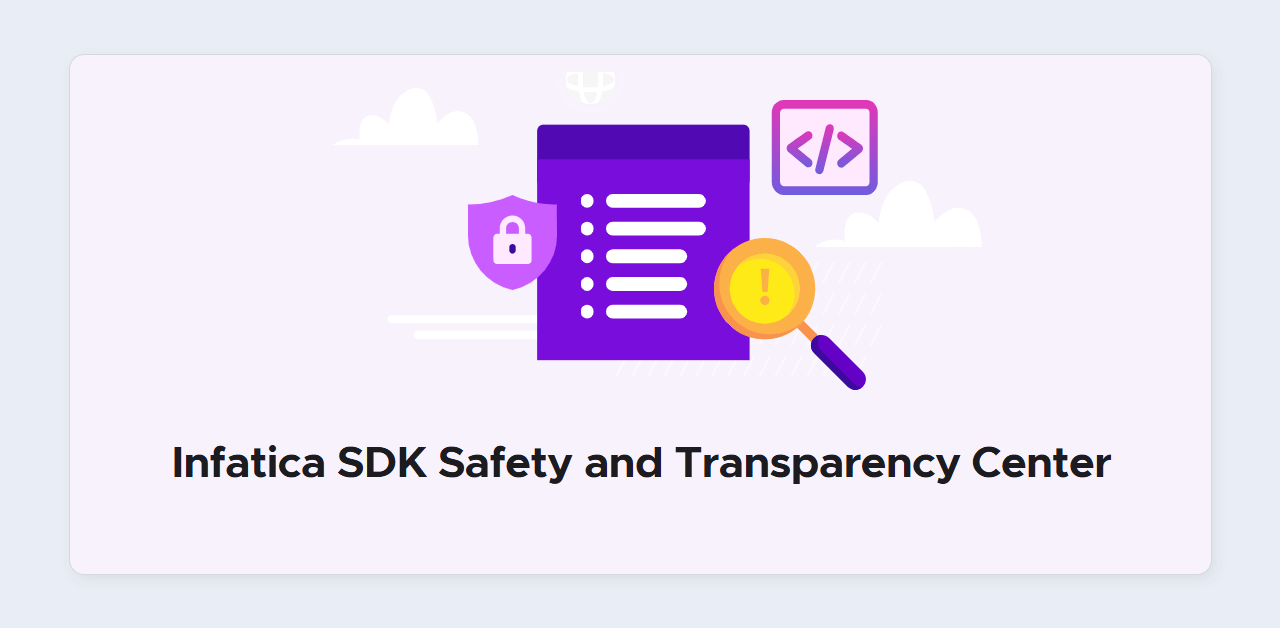When integrating any third-party SDK, developers need more than just performance – they need assurance. In today’s privacy-conscious landscape, security, transparency, and compliance are non-negotiable. That’s why Infatica SDK is designed not only to deliver passive monetization, but to do so responsibly. In this article, we’ll learn about Infatica SDK security and the measures Infatica takes to protect users, support developers, and maintain full regulatory compliance.
Audits & Security Measures
Security isn’t just a feature of the Infatica SDK – it’s a foundation. In an era where trust and transparency are essential to any technology that interacts with user devices, Infatica takes a proactive approach to ensuring safety for both developers and end-users.
Industry-Leading Partnership with Bitdefender
To deliver best-in-class protection, Infatica has partnered with Bitdefender, a global leader in cybersecurity. This collaboration brings world-class threat intelligence and active protection directly into the heart of the Infatica SDK. Bitdefender’s technologies are deeply integrated, constantly monitoring and intercepting potential threats, including:
- Infected or suspicious URLs
- Untrusted or compromised web pages
- Phishing links and fraudulent content
This active protection layer allows Infatica SDK to also contribute to your app’s security posture, safeguarding both your infrastructure and your users’ devices.
Ongoing Security Audits and Vulnerability Checks

Infatica doesn’t rely solely on third-party protection. The SDK undergoes regular, rigorous security audits performed by both internal teams and external experts. These audits focus on identifying and resolving:
- Potential code-level vulnerabilities
- Resource misuse risks
- Protocol weaknesses or outdated libraries
- Any behaviors that could lead to non-compliance with security or privacy standards
Audit frequency increases when changes are made to the SDK’s core functionality, ensuring that every update maintains Infatica’s high security standards.
Threat Response and Continuous Improvement
Security is a moving target, and Infatica treats it as a continuous process rather than a one-time achievement. The SDK is constantly monitored and updated to respond to:
- New malware signatures
- Emerging network-based threats
- Evolving platform-level requirements (e.g., iOS, Android, Windows updates)
- Feedback from developers or users
Combined with Bitdefender’s threat intelligence feeds, this adaptive response system ensures the SDK remains resilient in the face of an ever-changing cybersecurity landscape.
Commitment to Transparency
At Infatica, we understand that trust must be earned – and that trust begins with transparency. In today’s digital environment, users expect clear communication about how their data and devices are being used. That’s why transparency is not just a value at Infatica – it’s a standard we build into every layer of the SDK.
Clear Purpose, No Hidden Functions
The Infatica SDK is engineered with a single, well-defined purpose: to enable passive monetization through secure, lawful, and ethical participation in our peer-to-business (P2B) network. It does not collect sensitive personal data, run concealed processes, or access unrelated system resources. We’re upfront about what the SDK does – and just as importantly, what it does not do. Bandwidth contributed by users is only utilized for legitimate, vetted enterprise use cases, such as:
- Load testing
- Content delivery optimization
- Publicly available web data access for research and compliance
There is no ambiguity, no misuse, and no exceptions to this principle.
Seamless, Visible Integration
The SDK integrates easily into developers’ apps – but it’s not hidden from users. In fact, we encourage and enable developers to clearly communicate the SDK’s purpose through user-facing prompts, onboarding flows, or updated End-User License Agreements (EULAs). Transparency means users know they are joining a network, understand what that means, and see value in that decision.
Informed Consent as a Core Requirement
We require developers to obtain explicit, informed consent from every user who participates in the Infatica network. This includes:
- Explaining what the SDK does
- Describing how bandwidth will be used
- Clarifying the benefits of participation
- Ensuring opt-in is voluntary and revocable
Unlike formal legal checkboxes, this is a commitment to ethical development and user respect. Infatica offers developers resources and templates to help communicate this clearly, while still adhering to platform-specific guidelines and privacy laws.
Upholding User Rights and Privacy
Transparency also means being honest about boundaries. The SDK is designed to protect user privacy by not collecting or storing personally identifiable information (PII), avoiding any form of invasive device behavior, and operating under strict usage rules with ongoing oversight.
Data Privacy and Anonymization
In the age of data-driven monetization, user privacy has become one of the most important – and most scrutinized – aspects of any software integration. At Infatica, we treat data privacy not as a regulatory burden but as a foundational design principle. The Infatica SDK is built to prioritize user protection, data minimization, and full compliance with global standards.
No Personally Identifiable Information (PII)

The Infatica SDK is specifically engineered not to collect or process any personally identifiable information (PII). It does not access sensitive user data, personal files, app usage history, contacts, or any information unrelated to its function. Instead, the SDK operates at the network layer to support bandwidth sharing between opted-in users and vetted enterprise clients – without ever tying data back to individuals. This approach significantly reduces risk for both app developers and end-users, ensuring that the SDK’s presence does not compromise the core privacy posture of your app.
Anonymization by Design
Infatica uses built-in anonymization mechanisms to further protect any data required for the SDK to operate. Network-related information is stripped of identifying markers and processed in a way that prevents the re-identification of users or devices. This includes:
- Aggregated and non-specific metadata
- No tracking of individual sessions, browsing behavior, or app activity
- Secure transport protocols that block unauthorized access or eavesdropping
These safeguards ensure that developers can benefit from passive income while users remain anonymous within the system.
Minimal and Transparent Data Use
The SDK adheres to a strict policy of data minimization – collecting only what is necessary, for no longer than needed. Infatica never sells user data or shares information with unauthorized third parties. The network is closed-loop, designed specifically for enterprise-grade, compliant use cases such as:
- Public web data access
- Network performance benchmarking
- Load balancing and infrastructure testing
None of this involves end-user tracking, advertising identifiers, or behavioral profiling.
Aligned with Global Privacy Standards
From the outset, the SDK has been designed to align with the world’s most stringent data privacy frameworks, including:
- General Data Protection Regulation (GDPR)
- California Consumer Privacy Act (CCPA)
- App Store and Play Store privacy guidelines
- Industry-standard encryption and data handling protocols
As regulations evolve, Infatica actively monitors changes to stay ahead – updating SDK components and developer documentation to remain compliant across jurisdictions.
Trust Through Clarity
Ultimately, user trust stems from clarity. Developers are provided with up-to-date privacy policy templates, consent flow guidance, and EULA language to ensure that their users are fully informed about the SDK’s function and data practices. This empowers you to be transparent without needing to become a legal expert – and lets your users make informed, confident choices.
Regulatory Compliance
Infatica SDK is designed with compliance at its core. From the outset, it adheres to major global data protection frameworks, including the General Data Protection Regulation (GDPR) and the California Consumer Privacy Act (CCPA).
This means developers can confidently integrate the SDK without risking legal exposure – and users can trust that their rights are respected. Infatica follows key principles such as data minimization, purpose limitation, and transparency. Just as importantly, we require all partners to obtain explicit user consent before any participation in the peer-to-business network begins. By staying current with evolving regulatory standards, Infatica ensures that your monetization strategy remains ethical, compliant, and future-proof.
Why ISO/IEC 27001:2022 Certification Matters
Infatica’s ISO/IEC 27001:2022 certification demonstrates our commitment to maintaining the highest standards in information security management. This internationally recognized standard verifies that Infatica has established a comprehensive framework for managing and protecting sensitive data – from internal systems and processes to customer-facing technologies like the Infatica SDK.
For developers and partners, this certification provides independent assurance that Infatica follows best practices in:
- Risk assessment and mitigation
- Data access controls and encryption
- Continuous security monitoring and incident response
- Legal compliance and documentation standards
In practical terms, it means the SDK is built and maintained within a secure, auditable, and trusted environment – giving developers the confidence that their users’ data and trust are protected by more than just promises. It’s protected by proven, externally validated systems.
Frequently Asked Questions
Is the Infatica SDK safe for end-users?
Yes. The SDK is built with strict security protocols and is backed by Bitdefender, which actively protects against malicious traffic, phishing, and unsafe connections – ensuring a safe experience for your users.
Does the SDK collect any personal data?
No. The SDK does not collect or store personally identifiable information (PII). It only uses anonymized, non-sensitive data strictly necessary for functionality, following the principle of data minimization.
Is the SDK compliant with privacy laws like GDPR and CCPA?
Absolutely. Infatica SDK is fully compliant with GDPR, CCPA, and other major data protection regulations. Developers are also required to obtain explicit user consent before any participation in the network.
How does Infatica ensure ongoing security?
Infatica performs regular internal and third-party security audits, continuously monitors threats, and partners with Bitdefender for real-time protection. This ensures the SDK remains secure against emerging vulnerabilities.
What does ISO/IEC 27001:2022 certification mean for developers?
It confirms that Infatica follows globally recognized best practices in information security management. This gives developers confidence that all systems supporting the SDK are secure, monitored, and compliant with international standards.
